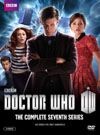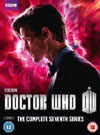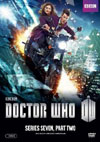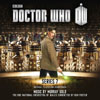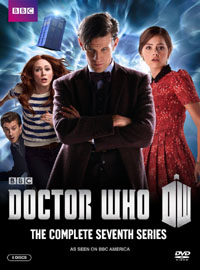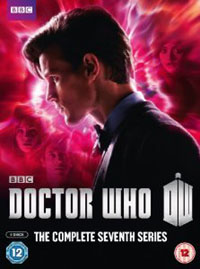DVD Extras for this story on the 15-episode box sets include:
Opening DrawWe see here writers other than Moffat demonstrating the wisdom of keeping the domestic Earthly scenes short while spending the bulk of the story's time in settings far more interesting. The Earthly bits are actually quite important though. Some combination of curiosity and distrust has the Doctor "researching" his companion's past before properly picking her up for their "second date". Ultimately Clara's little bit of backstory here is one of the adventure's better narrative threads and it feeds nicely into the central theme of the episode.The story's second beat is all about Clara's journey in the TARDIS to explore her first new world, which is also fun and quite successful. Unlike the first section, this segment could do with a bit more demonstration of the police box's materialization trick. The short hop it makes to get its occupants closer to the main action really stands out as being a bit too cheap in leaving out the effect. But both the momentum this story has gained from the previous one plus the addition of so many spectacular visuals of the planet, its rings, and the various cultures on display in the marketplace all help to bring alive that fantastic sense of adventure that should always remain at the core of this show. I love the nice little touches saying that the Doctor had been here before with his granddaughter, and that he should come here more often - nice acknowledgements of the show's history and the direction it should proceed in. I also loved the fact that our protagonists are here to celebrate alien cultures rather than combat them, another huge plus. Clara proceeds into a mysterious third story beat all by herself as she encounters Merry Galel, the Queen of Years, and uses her governess/nanny/entertainment director instincts to try and help her. This is also working very well, employing the type of suspense that the horror fans may be looking forward to, fostering a lot of intrigue as to who all these various aliens are that are looking for her and what their motivations might be. The sequence also boils down to some very simple advice that youngsters or adults may want to use to help overcome their fears. All to the good.
Space OperaThe episode uses all these elements to build nicely for its first 18 minutes or so, before settling down in the amphitheatre and fizzling out somewhat. At this point, we can wonder whether or not Merry will get her song correct (as we've been primed to), whether or not Clara was right to intervene, and exactly how the alien traditions here are expected to play out versus what might actually take place in the story.... but I think the audience will inevitably be a bit too culturally lost here to find compelling drama in those questions alone, and the narrative palpably feels that it may have run out of things to offer at this point.Unless of course, opera is your thing. The term "Space Opera" has often been used to describe many different films and TV series, but I don't think it has ever been so literally applicable as it is here in this story. Opera really isn't my thing. Composer Don Davis in his DVD interviews gives very insightful reasons why the more operatic pieces of music he wrote for "The Matrix 3: Revolutions" should be sung in a language other than English to avoid sounding silly, ultimately resulting in lyrics taken directly from the words of the Upanishads. Sadly, the music of Akhaten falls into the trap here, improbably heard in complete and perfect English which robs the ceremony of its sense of being otherworldly and mysterious. It very often does sound silly. Something far more alien would have suited this story much better. I think the simple fact that the visuals largely are people singing and listening also puts dramatic interest on too low a boil for Doctor Who.
Strategic MuddleAs might be expected, something does go awry, and it pulls our regulars into a series of action beats and plot stratagems that will occupy them for the bulk of the episode. Funnily enough, most of this section causes me to ask "Prime Directive" questions in my head, even though the Doctor has always espoused the role of hero instead of the non-interference policies of his own planet, or those of Star Trek. But this time around, it seems that neither he nor Clara know enough about what this ceremony is supposed to be all about, to jump in and meddle as much as they do. It's also a wonder that the population of an entire star system and their guests are watching this as a public spectacle without anyone else jumping in to have their say, be they in positions of authority or just concerned spectators. Is this ceremony actually going according to plan? If not, exactly what triggered the change? If they can all travel from asteroid to asteroid in this ring without fear of not having any atmosphere to breathe properly, what are the rules here? Is anyone in any danger at any point? I'm all for the Doctor and Clara pursuing answers to these questions and then taking appropriate action, but I find it hard to stay emotionally invested in many of the actions they do take because they didn't get good answers first.Ultimately, I don't think we ever do get enough answers in this story to make satisfying sense of the bulk of the major conflict. The concept of religious sacrifice is constantly being hinted at and then dispelled. Are there forces here expecting Merry to sacrifice her life or did they just want her to sing a song? Exactly who or what snatches her towards the pyramid, and with what intention? Is the waking Grandfather figure in control of the others, or are they in control of him? Or is everyone just following an institutionalized tradition that is running amok, a myth that is in need of being debunked? One of the chief sore points with the flow of information in this story is in trying to make sense of how much Merry knows at any given point. She says early on that she has memorized all the relevant religious texts and songs... which maybe means she's got the four big ones covered and believes that that is all there is, when in fact there are more both popular and obscure. She is young after all. But she flip-flops back and forth over important ideas too completely. She often believes she's not in any danger early on, then later she has apparently known all along that The Vigil's main purpose is to feed her to Grandfather. During much of this, we do get some half decent attempts at action bits. The Vigil sport quite an interesting design and have some cool effects for their abilities. Their appearance greatly reminds me of something similar seen in "Underworld" (story no. 96), although these creatures seem to be working better. But it doesn't feel like the story knows best how to use them. The sonic screwdriver definitely winds up as the solution to too many problems during these action beats. Ultimately, everything we learn up to a point is pulled out from under us as the story shifts from focusing on Grandfather to focusing on the planet itself. Exactly how much of the sacrificial religious mechanism defined back then was actually bunk, and how much is still supposed to be true? Even when this story suggests answers to many of its key questions, many of them are false. Figuring out just how many perhaps requires too many repeat viewings and is asking a bit too much of the casual audience.
Skeptics ReversalThe central theme of this reversal seems to imply that even after due skepticism has deconstructed obviously false and unnecessary religious traditions, something much more real and powerful and spiritual might be found to be at the heart of it all, where we should actually focus our energies and emotions and actions. A great message, if that's the intention. But it all remains muddled since the mechanisms on both sides of this revelation aren't really fleshed out well enough to be believable.Me, I'll buy a major geological instability on the planet, perhaps synchronized with predictable astronomical alignments within the star system. I'll even buy that the planet has some level of living consciousness such that its geological instability can be influenced by large crowds of sentient humanoids all focusing on it at once, using pyramid architecture to focus their efforts. What doesn't work so well for me is that we end up looking at a hallowe'en pumpkin carving face staring angrily out at us from the planet, while at no point do we get any kind of understanding of the planet's changes in geology or mass or volume, or what the corresponding emotions should be and why. What exactly does this planet need to be to fulfill its natural role in balancing the system? What is pulling it out of balance? I am forever optimistically hoping that these answers point to something more evolved than its desire to have its ego stroked by leaching energy (or Offerings) of some form from individuals in the gathered masses. If I had a chance to fix this script, the first move would be to move most of the action and screen time outside of the restrictive ceremonial concert, to help let the drama breathe. We need a few more speaking characters to flesh out the conversations and champion the varying points of view as to what is going on and what significance and meaning any of this has for society and for astronomy. A good template may indeed be "The Aztecs" (story no. 6), which featured a strange culture utilizing many bizarre ceremonies, but kept actual screen time of those ceremonies to a minimum, and knew instead how to get great value from scenes of character interaction leading up to or away from those ceremonies.
Emergent ThemesWhat still manages to come out of this half-clumsy examination of another star-system's culture remains an interesting view of the universe. In that view, the primary ingredients of souls are stories, specifically stories with personal meaning and deep emotional charges.... and this is so ingrained here that their currency finds its basis in this. Though I wouldn't adopt their philosophy verbatim, I think there is significant food for thought within it that has much value.And in the end, this philosophy triumphs a little, as both the Doctor and Clara have to dig down and each find the most valued stories of their own souls, to share with each other and the star system's public at large. It strengthens their bond with each other, and becomes one of the successfully triumphant beats of the story. It is really nice to see subject matter of this kind explored and celebrated on Doctor Who. And this is great material to use in tandem as a final fix for the main conflict. It's just too bad that the mechanisms that might make sense of the antagonists' responses to it remain so poorly defined.
This story will probably also take a bit of a hit for ending its Akhaten portions so abruptly. I get that somehow the Doctor and Clara brought peace to the planet's grumbling stomach, but exactly what the hell happened? Did the planet implode into non-existence in the final shot? The astronomer in me insists that that can't have been good for the inhabitants of the rings. Or is it now a tiny speck of supercompressed matter, maintaining essentially the same gravitational influence? And what do the locals think of all this? Are they pleased with the outcome, or shocked, or outraged, or enamoured? Is it, "Great party this time; let's do it again in 1000 years!" or is it like "Oh crap, this is the end of everything we've ever known or done!" Or all of the above depending on who you talk to? It's a bit hard to imagine that everything's all peachy enough for a feel-good ending without getting better answers here yet again. And the survival rate of Season 33's alien planets once again doesn't look too good. The wrap up once more sees the Doctor dropping Clara off at home before midnight, which is one of the main reasons why their relationship seems to be more about dating each other than falling into the more traditional traveling companion routine. It's an interesting dynamic, better than many others we've seen in New Millennium Who. But I began to wonder here if Clara would ever stay aboard the TARDIS between adventures? Time will tell. At least we get a real materialization at the end - probably because it's the only shot that lets us know that the Doctor has brought Clara back home. Perhaps it shows a bit too much that the budget for this one didn't extend to any exteriors of Clara's house, which the show could have used. Too bad the director of the previous episode couldn't have snapped a few when they were there.
International Titles:Deutsch: "Die Ringe von Akhaten"Magyar: "Akhaten gyűrűi"Français: "Les Anneaux d'Akhaten"Русский: "Кольца Акатена"Italiano: "Gli anelli di Akhaten"This story has become available on DVD and Blu-ray.
This story is also available in an 8-episode volume with minimal extra features. The U.K. version also includes the episode "The Snowmen"; North American versions do not. Click on the Amazon symbol for the location nearest you for pricing and availability:
Comments on this article are welcome. You may contact the author from this page:
|
|||||||||||||||||||||||||||||||||||||||||||||||||||||||||||
